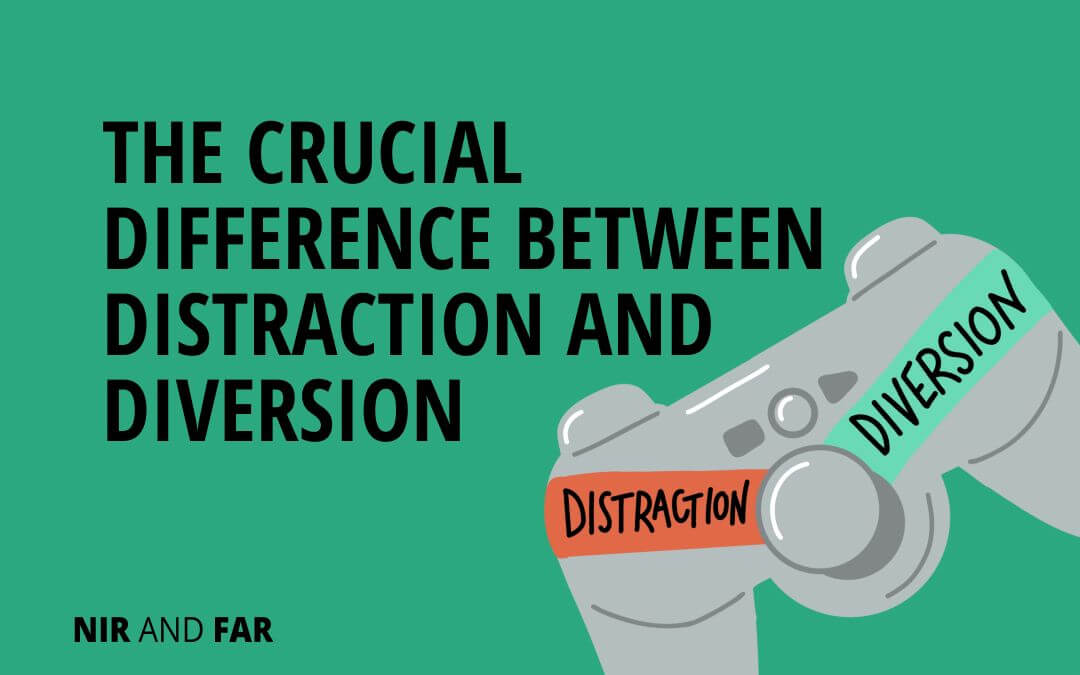Because I write about distraction and how to avoid it, I often get asked the question “Aren’t distractions sometimes a good thing? Don’t we all need some distraction in our lives?”
Nope!
The Big Difference

Distractions are always bad. Period. Diversions, on the other hand, can be good. This isn’t just hair-splitting: The two concepts are fundamentally different, and if you want to use your time productively, you need to understand the important distinction between them.
As I explain in my book Indistractable, distraction is an action that pulls you away from what you intended to do.
Distraction prevents you from living out your values and becoming the person you want to become. It’s the opposite of traction, actions that move you toward what you really want.
Some Interesting Examples

Here’s one of my favorite examples of a helpful diversion: Children are notoriously anxious before surgery, and their levels of preoperative anxiety are known to reduce the effectiveness of anesthesia and increase recovery times. But sedative medications aren’t generally a good idea for kids, so physicians need alternatives to keep them calm.
In a 2006 study, one group of children was given anti-anxiety medication before surgery, another group played handheld video games, and a third control group was given no medication and no video games before surgery. The kids in the video-game group were the only ones to show a decrease in anxiety before surgery. Amazingly, they also required less anesthesia during the procedure and suffered from fewer medication side effects after surgery.
The video games proved effective, researchers believed, because they diverted the children’s attention from uncertainty and fear. The engaging nature of the video game helped children focus away from the inevitable discomfort of their situation and toward the challenge of the game.
The same technique works on adults, too, as shown in burn patient research. Burn patients are typically given large doses of medications to help them through the excruciating pain of cleaning their wounds. But scientists at the University of Washington, Seattle, designed a virtual reality game that diverted patients’ attention and immersed them in a different set of circumstances. The researchers found that patients who played the game during wound cleaning felt up to 50% less pain. In fact, playing the virtual reality game was more effective at reducing pain than using medication. That’s a healthy diversion.
The game was still traction, not distraction, because it was exactly what the patients wanted to do with their time and attention. They were simply diverting their focus away from suffering they couldn’t otherwise control.
What You Need To Know
 So, beyond painful medical scenarios, when exactly is diversion a good idea?
So, beyond painful medical scenarios, when exactly is diversion a good idea?
Here’s a rule of thumb: When the suffering you’re experiencing is outside your control and unreasonable for you to escape.
You can’t reasonably expect someone who’s undergoing burn treatment to be 100% zen. Similarly, you can’t reasonably expect a young child to be totally quiet and relaxed on a five-hour flight. They’re going to suffer some boredom, and that suffering (depending on their age) may be outside of their control. In those times, something like an iPad can be a great diversion.
This is why, even though I’m a proponent of raising indistractable kids, when I take my daughter on a very long road trip or flight, she can spend more time watching movies and shows. That’s not a distraction from something she ought to be doing; it’s a perfectly healthy diversion from an uncomfortable situation that’s outside of her control.
On the other hand, I don’t support letting the iPad become an iNanny at the dinner table, where a gadget would be a distraction from family time. Distractions are never good.
Diversions, however, can be a great tool for enduring pain or discomfort. By understanding the distinction, you’re empowering yourself to use diversions in a healthy way while avoiding wasting time on unhealthy distractions.
Related Articles
- Schedule Maker: a Google Sheet to Plan Your Week
- Habit Tracker in Google Sheets – Free Template
- A List of 20 Values [and Why People Can’t Agree On More]
- Timeboxing: Why It Works and How to Get Started in 2024
- An Illustrated Guide to the 4 Types of Liars
- Hyperbolic Discounting: Why You Make Terrible Life Choices
- Happiness Hack: This One Ritual Made Me Much Happier

WEEKLY SCHEDULE MAKER
Download a free schedule maker template
to help you design your ideal day.
Take back control of your time
and remove distraction from your life forever.
Your email address is safe. I don't do the spam thing. Unsubscribe anytime. Privacy Policy.

